How Much Does Composite Decking Cost in Colorado?
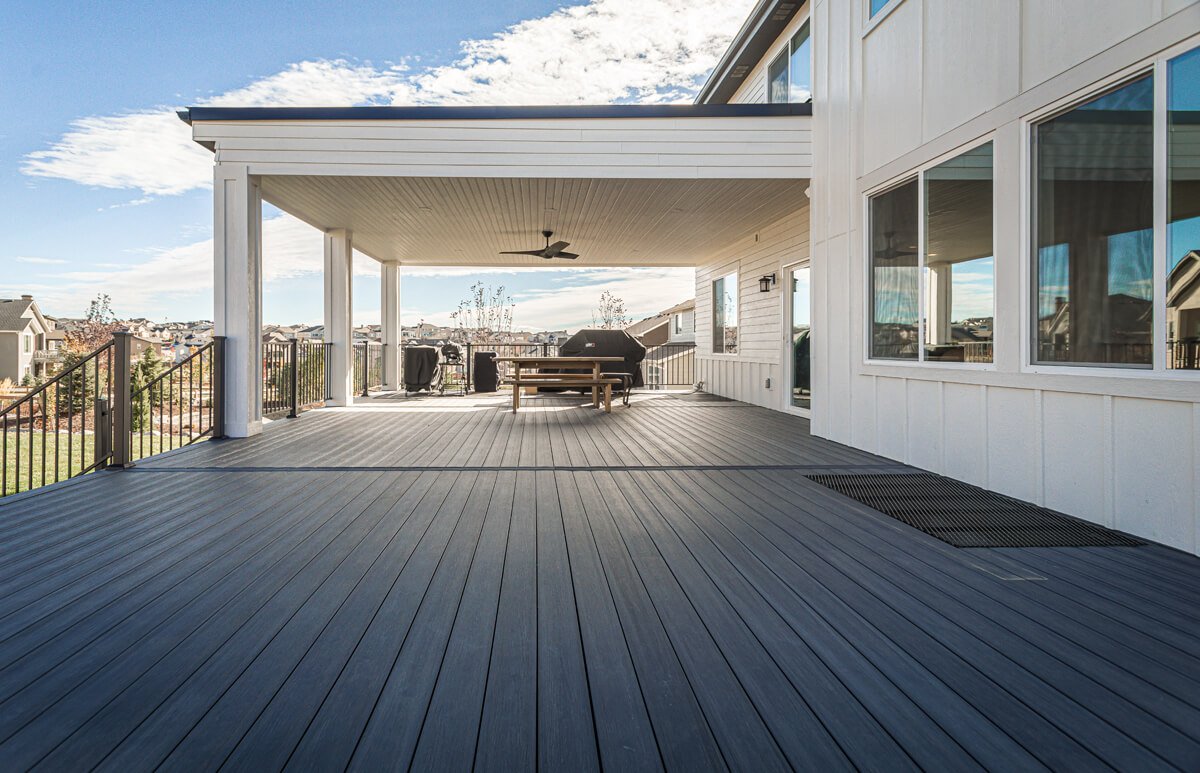
Though the exact cost will depend on factors like brand and style, Colorado homeowners should expect to pay between $4 and $14 per square foot of composite decking.
But remember — those numbers are for the building material alone! They don’t include permits, labor, or the cost of the deck’s framing, engineering, post piers, design. When all’s said and done, the final price tag for your composite deck will likely fall in the range of $75 to $140 per square foot.
Since it was popularized in the 1990s, composite decking has risen to fame because of its toughness, convenience, and aesthetic appeal. Still, it can be hard to decide whether composite decking or traditional wood will give you more bang for your buck.
Thankfully, the composite decking experts at Krueger Brothers are here to break it down for you. We’ll cover everything you need to know about the cost of composite materials, see how the leading brands stack up against each other, and compare them to natural wood. Plus, if you read to the end, we’ll give you some killer money-saving tips for your composite deck!
Composite Decking Cost Factors
As a rule of thumb, synthetic decking has a higher price tag than natural wood. But the cost of materials is just the starting place. Here are a few key factors to consider when you’re budgeting for your new decking project.
Decking Brand
A cost-efficient brand like Veranda might cost just $5 or $6 per square foot, but materials from a top-notch company like TimberTech or Gorilla could set you back $12 or more. Let’s take a look at the price range for popular composite decking brands:
- Veranda: $5 to $8 per square foot
- Fiberon: $5 to $10 per square foot
- MoistureShield: $6 to $12 per square foot
- Gorilla: $7 to $14 per square foot
- Deckorators: $8 to $14 per square foot
- TimberTech: $9 to $14 per square foot
- Trex: $9 to $15 per square foot
Decking Type
Though the brand you choose will have the greatest impact on the cost of your composite deck materials, you’ll also have to decide on which type of composite deck boards to use. Here are the four major styles of composite decking, ranked from least to most expensive:
- Two-faced grain (least expensive): Wood grain on one side, brushed on the other
- Textured grain: Equipped with a realistic artificial wood grain
- Embossed grain: Mimics the appearance, texture, and finish of natural wood
- Plastic-wrapped (most expensive): Resistant to water, sun, and insect damage, thanks to its durable plastic coating
Another option to be aware of is vinyl decking (sometimes referred to as PVC decking). Though vinyl decking is long-lasting and attractive, it’s also expensive, falling in the range of $10 to $14 per square foot.
Deck Size
Keep the size of your deck in mind when you’re picking a material! If you’re building a modest deck, you might be able to get away with upgrading to a high-end composite. However, if you’re installing a massive wraparound or multi-tier deck, the difference between a cutting-edge composite and cheaper wood could be tens of thousands of dollars.
Check out this chart for a ballpark estimate: for floor deck board products only.
* This chart does not include design, framing, piers, light fixtures or stairs.
| DECK DIMENSIONS | SQUARE FOOTAGE | PRICE RANGE |
|---|---|---|
| 8 x 10 | 80 | $2,000 to $4,000 |
| 10 x 10 | 100 | $3,000 to $5,000 |
| 12 x 12 | 144 | $3,400 to $8,500 |
| 12 x 20 | 240 | $7,000 to $12,500 |
| 16 x 16 | 256 | $7,200 to $12,800 |
| 14 x 20 | 280 | $9,500 to $14,500 |
| 12 x 24 | 288 | $10,000 to $15,200 |
| 16 x 20 | 320 | $10,800 to $16,000 |
| 20 x 20 | 400 | $12,000 to $22,000 |
Labor
Again, labor costs will vary depending on the complexity of your decking project and your location. Because of shifting labor markets, homeowners in Pueblo, Colorado Springs, and Denver might pay different prices for their deck installation — even if they’re building the same deck!
Generally, you should plan for labor to add between $10 and $15 per square foot. Though it increases your upfront cost, hiring an experienced decking professional like Krueger Brothers is the best way to ensure that your deck is installed precisely and efficiently. Our design build process is
permits
Though some small, freestanding decks don’t require a permit in Colorado, you’ll most likely need to obtain permits before you can begin to build your deck. Plus, if you’re hoping to add gas, electricity, or water services to your deck, you’ll have to acquire separate permits for each service.
As a whole, you should plan to dish out between $225 and $500 to secure the proper permits for deck building. Permit cost are effected by zoning, hillside, setbacks and variances.
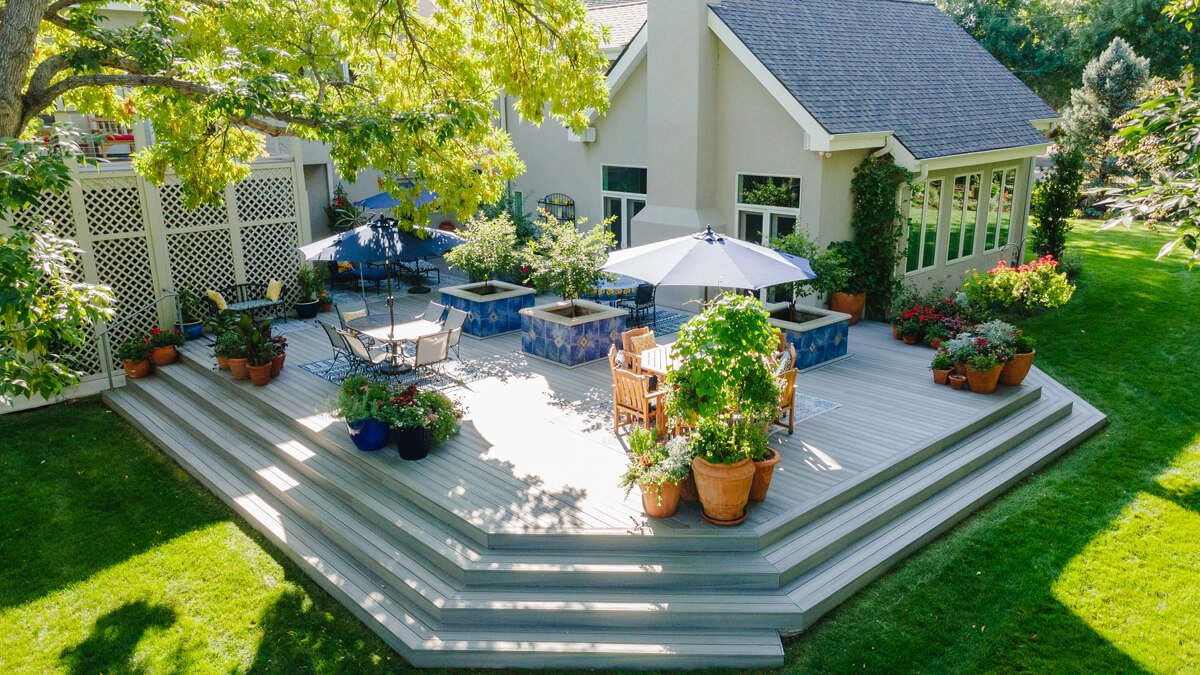
Additional Costs to Consider
Naturally, upfront costs will be the priciest part of your project — but the expense of building a deck doesn’t end once the final board is in place! Here are key long-term costs to be aware of.
Maintenance
Composite decking wins big in the realm of maintenance. Maintaining composite materials will set you back roughly $100 to $200 per year. Because most natural wood decks require sanding, staining, and sealing, they can easily cost $1,000 per year to maintain.
Warranties
If you’re looking for extra peace of mind, some deck contractors offer a 3-5 year warranty on their composite supplies. The average warranty costs less than a thousand dollars, but robust warranties can carry a much higher price tag. Krueger Brothers Construction Deck Warranty is 5-8 years for labor and material has a 30-50 year warranty. Each of our Deck projects included the labor warranty and the manufacturer’s warranty.
Cost of Replacement
This factor is a bit harder to quantify, but it’s definitely worth considering. On average, wood decks last for 10 to 20 years if pressure treated wood is used for the framing, and the post hole “pier” is done correctly, whereas composite decks can endure for 30 years or more. Sure, composite decking materials will require a bigger initial investment — but it’s likely to pay off over the coming decades, as your new composite deck retains its beauty and structural integrity.
Composite Decking Prices vs. Wood Costs
Cost of Composite Decking
As we mentioned earlier, most composite materials cost between $5 and $15 per square foot. Here’s a closer look:
- Low-end composites (Veranda, TimberTech, Trex Enhance Basics): $4 to $7
- Mid-level composites (Fiberon, TimberTech, Trex Select): $5 to $10
- High-end composites (TimberTech, Trex Transcend): $8 to $15
Cost of Wood Decking
Because of the wide variety of available woods, it’s difficult to pin down a consistent price tag. Mass-produced wood decking can cost as little as $2 per square foot, but premium wood species that are imported from other countries sometimes come with a price tag of more than $25 per square foot.
Check out our breakdown of the most popular options for a wood deck:
- Pressure-treated wood: $15 to $7 per square foot
- Bamboo: $3 to $8 per square foot
- Cedar: $4 to $8 per square foot
- Mahogany: $8 to $12 per square foot
- Tigerwood: $7 to $15 per square foot
- Redwood: $5 to $25 per square foot
- Ipe: $10 to $20 per square foot
Composite Decking vs. Wood: Pros and Cons
COMPOSITE
- Lasts 25-50 years
- $30-$60 per square foot
- Doesn’t require sanding, staining, or sealing
- A clean, consistent look
- Resists damage from water, insects, and sunlight
WOOD
- Lasts 10-20 years
- $20-$42 per square foot
- Requires sanding, staining, and sealing
- Natural wood aesthetic and texture
- Prone to damage from water, insects, and sunlight
Costs to Install It Yourself
After seeing the price tag on composite materials, many Colorado homeowners are tempted to cut down on costs by building their deck without professional help. If you’re thinking about ditching the pros and doing it yourself, you’ll want to answer one question first: is it worth it?
Here’s the short answer: it depends.
If you’re an experienced handyman and you’re building a simple deck, making it a DIY project can be a great way to save. Of course, you’ll have to invest lots of your own time into your new at-home project, but you could save thousands of dollars in building costs. Plus, you’ll get to showcase the final product with pride, knowing that you crafted it with your own hands.
If, on the other hand, your deck design is complicated (for example, a wraparound or multi-tier deck), it’s best left to the experts. Projects like these require the skilled touch of trained professionals.
Costs to Hire a Contractor
Hiring a contractor is the best way to guarantee that your deck is installed carefully, using world-class composite materials. Though hiring a contractor is more expensive than doing it yourself, you’ll be able to sleep soundly at night knowing that your deck quality is top-notch.
Best of all, many general contractors have multiple areas of expertise! For example, Krueger Brothers Construction specializes in decks, siding, roofing, windows, and doors, so we can make additional improvements to your deck and ensure that it fits seamlessly with the rest of your home.
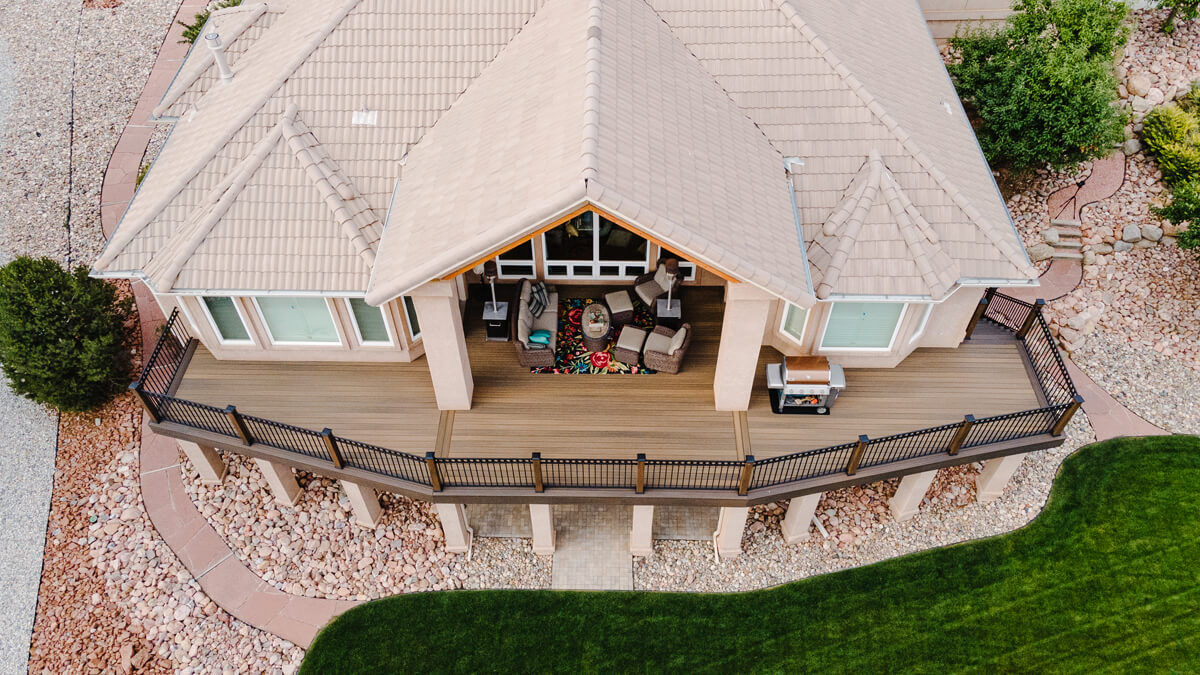
Tips to Reduce Composite Decking Costs
No deck is complete without a few fancy features: for example, furniture, a grill, or a fireplace. If you’re looking for extra cash to put towards those upgrades, try out these money-saving tips from Krueger Brothers:
- Make it a DIY project. Cutting out the cost of labor is one surefire way to lower your installation cost. This is an excellent option for homeowners who have a simple deck design in mind.
- Search for special offers. From Independence Day specials to low-interest financing plans, many contractors will collaborate with you to find an agreement that works.
- Look for seasonal deals. Here’s a perk of building a deck in Colorado: Most decks are built in the summertime! For cost-conscious Colorado homeowners, that means you can save a bundle by installing your deck during the off-season (late fall and winter).
- Get multiple quotes. Receiving estimates from two or three companies ensures that you’re getting a fair price. When you’re deciding between contractors, remember to search for the best balance of price and quality. The cheapest contractor isn’t necessarily the right fit for you! Make sure you are comparing apples to apples such as Permitting, approved plans, details of the frame, piers. Finished products can also effect the cost, such as, open or closed stairs, skirt board, divider boards and picture framing the deck. Each of these will impact the overall cost.
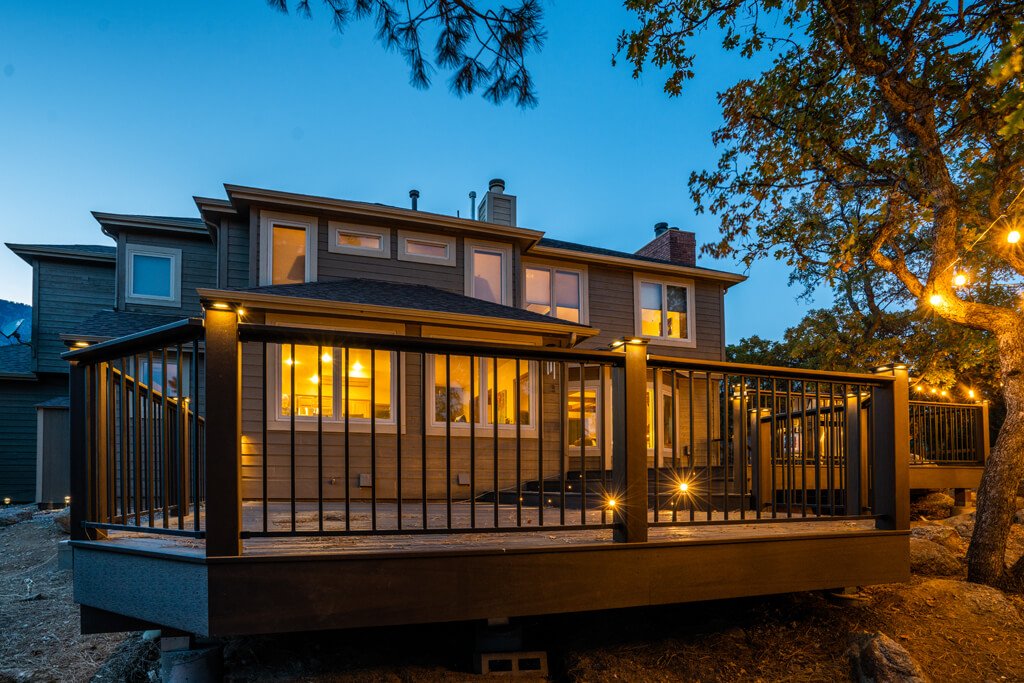
What Questions to Ask Your Contractor
Before you ink the final contract, you’ll want to make sure that your contractor is worth their salt. To guarantee that you’re getting first-class service, touch on these ten questions:
- How long have you been in business?
- What types of decking projects have you built?
- Would you show me some pictures of finished projects you have completed?
- Do you have some referrals that I can call?
- What recommendations do you have for composite decking?
- What’s your specialty?
- Do you subcontract?
- How long is your warranty good for?
- Are you licensed and insured?
- Will I receive progress updates?
- How long should I expect my project to take?
- What makes you unique?
- Will you be submitting and pulling your own deck permit?
If some of their answers sound shaky, ask if you can look at their previous projects. Respectable contractors will be thrilled to show off a portfolio of the beautiful work they’ve done for Colorado homeowners.
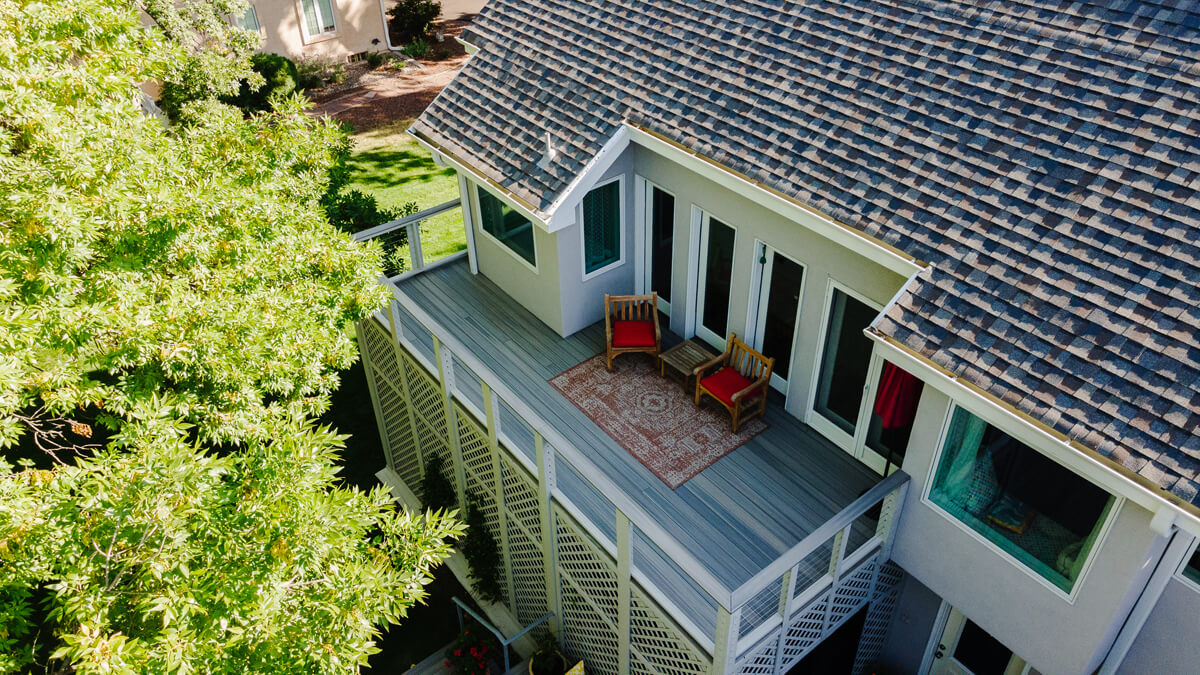
Transform Your Home With a Custom Composite Deck
Krueger Brothers Construction is the top deck builder in Colorado Springs. We’re passionate about decking projects, and we’d love to have a conversation about your dream composite deck. Whether you simply need an expert opinion on your decking material or you’re ready to break ground on your custom project, we’re here for you.
Let’s unlock the possibilities of your outdoor living space with a beautiful composite deck.
